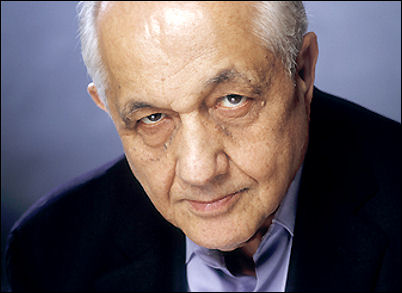I was strolling through the smallish medieval city of Bern this evening when I read that revered film critic Andrew Sarris, 83, had passed away a few hours earlier. I’d been on friendly-as-far-as-it-went terms with Sarris since ’77, and the news hit me in the gut. I tweeted that “a great film critic, a seminal influencer, a gentleman, gracious and kindly & always good humored…Andrew Sarris left us today. Sadness.”

Everyone will once again write about his two legendary feats — popularizing the auteur theory, which he’d appropriated from the Cahiers du Cinema gang, in a 1962 essay called “Notes on the Auteur Theory,” and writing “The American Cinema: Directors and Directions 1929-1968,” which anyone and everyone with the slightest investment in Film Catholicism had to read backwards and forwards, particularly if you came of age in the ’60s and ’70s.
But for me, Sarris was about kindness, wit, laughter and a generosity of spirit — the last trait in particular.
In the fall of ’77 Sarris agreed to talk about movies in front of a crowd at the Westport Country Playhouse Cinema, where I was working at the time. I drove down in my beater Mercedes and picked him up at his Upper East Side apartment and took him up the 95 to Westport, and then back to Manhattan three or four hours later. We obviously enjoyed some chat time, but what I primarily remember was his energy — a genuine inspiration for me. He seemed indefatigable. And I loved his rambling confessional tone. He always spoke of himself in humble terms, and always with a sardonic chuckle about some vague failing or two.
A year or two later I was a struggling New York freelancer, doubtful of my talent and unsure of my footing. I was at a black-tie New York Film Festival party, and I remember suddenly putting on a pair of jet-black Ray-Bans as I joined a group of five or six that included Sarris. He made me feel very much part-of-the-gang when he remarked a few seconds later that I looked “like a Roman pimp in a Fellini film.”
I’ve always half-despised the New York film dweebs who made me feel so awful during that period in my life, but never Sarris. I don’t know if he knew or cared about what I’d been writing and reporting in the late ’70s and early ’80s. I do know that he offered respect and camaraderie and comfort, and I will always love him for that. Warm hugs and condolences to all who knew, read, respected and loved him as well.
